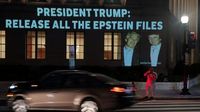The Justice Department took a bold step on Friday, August 8, 2025, seeking to unseal grand jury exhibits and transcripts tied to the notorious Jeffrey Epstein and Ghislaine Maxwell cases. This move, spearheaded by Attorney General Pam Bondi, marks an escalation in the Trump administration’s campaign to bring the so-called "Epstein files" into the public eye—an issue that’s stirred up intense interest and political wrangling across the United States.
According to filings reviewed by CNN and Nexstar Media Inc., Bondi, joined by Deputy Attorney General Todd Blanche and Southern District of New York U.S. Attorney Jay Clayton, formally petitioned two New York federal judges to expand the scope of materials to be released. The request now covers not just five days of grand jury testimony, as previously sought, but also exhibits from both the Epstein and Maxwell proceedings. The Justice Department’s filing emphasized that all documents would be subject to "appropriate redactions of victim-related and other personal identifying information," a nod to the fraught privacy concerns at stake.
This legal maneuver is the latest chapter in a years-long saga involving Epstein, the disgraced financier who died by suicide in his jail cell in 2019, and Maxwell, his longtime associate, who was convicted of child sex trafficking in 2021 and is currently serving a 20-year prison sentence. The shadow of their crimes—and the question of who else might have been involved—has loomed large in the public imagination, fueling speculation, conspiracy theories, and calls for transparency from both ends of the political spectrum.
Yet, as CNN reports, the administration’s efforts have repeatedly hit roadblocks. In July, a Florida judge declined to unseal transcripts related to Epstein’s earlier criminal case from the early 2000s, which ended in a controversial plea deal allowing Epstein to serve about a year in prison. Observers have voiced skepticism about whether the grand jury materials, even if released, would actually reveal much that isn’t already public knowledge. Still, the symbolic weight of the move is hard to overstate—especially with President Donald Trump himself facing mounting pressure from both his base and Democratic critics to deliver on promises of transparency.
The Justice Department’s push comes at a time when the so-called "Epstein files" have become a political football. The public’s hunger for answers has only grown, and the administration has faced criticism for what some see as a lack of openness. A July 7, 2025, memo from the Justice Department stated flatly that no further information would be released and denied the existence of an Epstein "client list"—a point that’s done little to quell rumors. Meanwhile, CNN recently reported that Bondi briefed President Trump on the files in May, and that Trump’s name appeared several times within the documents. This revelation has only added fuel to the fire, with both supporters and detractors scrutinizing every development for signs of a deeper story.
But the effort to unseal the grand jury materials is hardly a straightforward matter. Grand jury evidence is, by default, kept secret under U.S. law—a safeguard meant to protect the privacy of witnesses and the integrity of the legal process. In this case, those protections are at the heart of the debate. Maxwell’s attorneys, for instance, have vigorously opposed the Justice Department’s push, arguing in a court filing earlier this week that unsealing the materials "would compromise her privacy and her prospects to appeal her case." They maintain that her legal rights must come before the public’s desire for disclosure.
Victims’ voices have also played a pivotal role. Lawyers representing several of Epstein’s alleged victims have submitted letters to the judges, expressing a range of opinions. While many victims did not directly oppose the release of materials, a significant number requested "severe redactions in order to protect their identities," as reported by CNN. Some victims, weary from years of public scrutiny and legal battles, voiced concern about being used as pawns in what they described as "political warfare" by the Trump administration. The tension between the right to privacy and the public’s right to know has rarely been more palpable.
In response to these concerns, the Justice Department assured the court that it would submit only transcripts and exhibits, with careful redactions for victim and personal information. Bondi and Blanche indicated in their Friday request that they would provide sealed filings to the judges, detailing which portions of the exhibits had already been made public. Additionally, the Department has begun contacting victims whose names appear in the grand jury exhibits but not in the transcripts, and is notifying all parties about the extent to which their names feature in materials not admitted during Maxwell’s trial.
Federal judges Richard Berman and Paul Engelmayer, who are overseeing the proceedings, had asked the Justice Department for clarification on whether it wanted to unseal exhibits in addition to transcripts. The Department’s answer was unequivocal: yes, with the proviso that any release would be subject to input from victims and their representatives. To that end, the DOJ has requested that both judges refrain from making any decisions on the release of the exhibits and transcripts until they’ve heard back from all victim-related parties next week.
All this comes against a backdrop of skepticism about what, if anything, the grand jury materials might reveal. Some legal analysts, as cited by Nexstar Media Inc., have questioned whether the documents will contain significant new information, or whether they’ll simply confirm what’s already known. Still, for many Americans, the issue is less about the specifics and more about the principle: should the government be as transparent as possible, especially in cases involving powerful figures and heinous crimes?
Of course, not everyone agrees on the best path forward. Supporters of the administration’s push argue that sunlight is the best disinfectant, and that the public deserves to see the full record, even if it means revisiting painful episodes. Critics, meanwhile, warn that releasing sensitive materials could retraumatize victims, compromise ongoing legal proceedings, or set a dangerous precedent for future cases.
As the court considers its next steps, the stakes remain high. The Justice Department’s request to unseal the Epstein and Maxwell grand jury materials is as much about politics and public trust as it is about the law. With both sides digging in, and victims caught in the middle, the coming weeks are likely to see even more heated debate—and perhaps, at long last, some long-awaited answers.
Whether the "Epstein files" ultimately deliver new revelations or simply close the book on an ugly chapter, the nation will be watching closely. For now, the story remains one of secrecy, struggle, and the enduring quest for justice.





